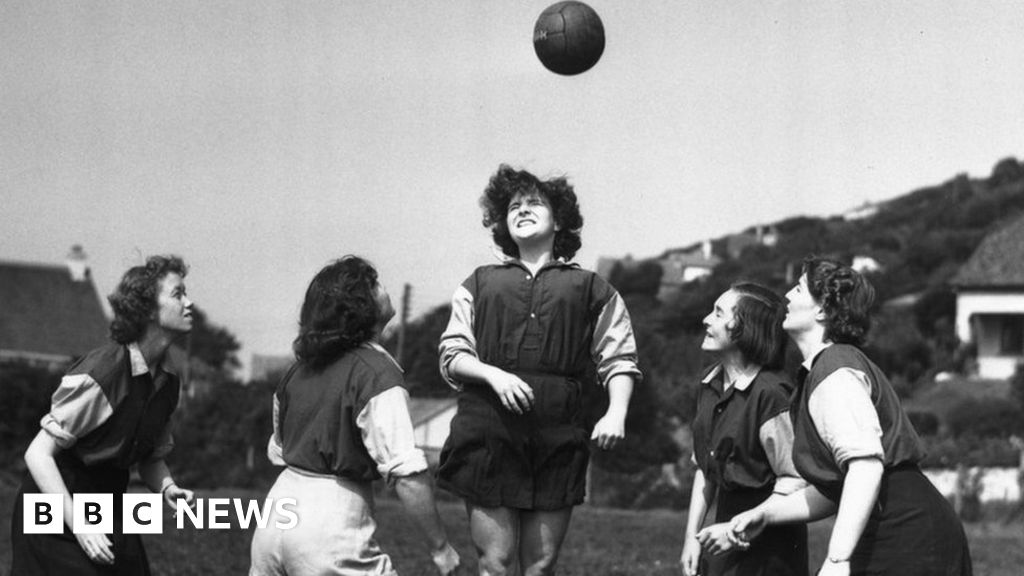Millions of people will be tuning in to see England take on Spain in the Women's World Cup final.
The tournament in Australia and New Zealand has so far seen more than 1.7 million tickets sold and has been the highest-profile women's football competition yet.
It's the latest peak in a growing interest in the women's game, which has been building up over the last few years – after decades in the shadow of men's football.
But it wasn't always like that – at one time, the sport flourished in England.
Matches pulled in huge crowds – sometimes more than 50,000 people.
But then the women's game was effectively banned, with the FA at the time saying the game of football was "quite unsuitable for females".
It was another half century until women's football got back on its feet – and that's one reason it lags behind the men's game today.
Lily Parr was a winger and one of the first female professional players.
She played for the Dick, Kerr's Ladies team which got its name from the munitions factory in Preston where most of the team worked during World War One.
They were the first women's team to play wearing shorts, and the first to go on an overseas tour.
Lily was also a smoker, which led to rumours her wages were supplemented by packets of Woodbine cigarettes.
In 2002, she became the first woman to be inducted into the National Football Museum Hall of Fame – and she recently became the first female footballer to be commemorated with a statue.
There was a huge growth in women's football during the war when women were called upon to do factory jobs left by the men who had gone to fight.
On Christmas Day in 1917, 10,000 spectators watched two women's teams playing at Preston.
And when Dick, Kerr's Ladies played St Helen's Ladies on Boxing Day 1920 they pulled in a crowd of 53,000 at Everton's Goodison Park ground, with thousands more fans locked outside.
On 5 December 1921, the Football Association banned women from playing on FA-affiliated pitches which meant stars like Lily Parr could no longer play at grounds with spectator facilities.
The FA at the time said "the game of football is quite unsuitable for females and ought not to be encouraged".
In 1971 the ban was finally lifted following the formation of the Women's Football Association (WFA) a couple of years earlier.
The Sex Discrimination Act of 1975 made it easier for women to train to become professional referees.
This video can not be played
A profile of Joan Briggs, "celebrated star of the ladies' soccer world".
It has always been pretty tough to watch women's football on television with the first TV reports of the Women's FA Cup final results in the 1970s.
In 1989 Channel 4 started to provide regular coverage of women's football.
And the FA outlined its plans to develop the women's game from grassroots to elite level in 1997.
It was only in 2018 that the Women's Super League (WSL) became fully professional.
Now, the latest figures show 3.4 million women and girls play football in England.
The Euro 2022 final drew a record crowd of 87,192 at Wembley, where England beat Germany to win their first major women's tournament.
There has since been growing investment, meaning better salaries and longer contracts for women.
When it comes to those watching on TV in the UK, England's World Cup semi-final against Australia was the most watched of the tournament so far, with a peak audience of 7.3 million.
A version of this article was published in 2019.
The Women's World Cup final between England and Spain on Sunday will be shown live on BBC One, BBC iPlayer and the BBC Sport website from 09:45 BST.
BBC Radio 5 Live and BBC Sounds will have radio commentary as both sides aim to win their first World Cup.
The BBC Sport website and app will provide live text commentary from 08:00 BST.
Follow Newsbeat on Twitter and YouTube.
Listen to Newsbeat live at 12:45 and 17:45 weekdays – or listen back here.
Five things that held women back in football in England
England reach first Women's World Cup final
Women's World Cup 2023: Everything you need to know
An audible sigh of relief in the Middle East
Man who set fire to himself near Trump trial dies, US media says
An attack on women that has devastated Australia
An audible sigh of relief in the Middle East
How Taylor Swift captured modern dating despair
An attack on women that has devastated Australia
What we know about Israel's missile attack on Iran
From WhatsApp to Greggs – why is tech going down more?
After hunt for impartiality, who are the 12 Trump jurors?
Can AI help solve Japan’s labour shortages?
Disasters, dancers and a Duke: Photos of the week
Baby Reindeer star on 'role of a lifetime' in disturbing stalker drama
'I'm not difficult… I just cannot take mediocrity'
Explore the meteoric rise to fame and troubled personal life of the comedy pioneer Peter Sellers
Unearthing the fascinating stories of our ancestors
Britain's Biggest Dig gives a glimpse into the life of the rich and poor of Georgian London
Profound revelation, glorious chaos and a lot of laughs
Michael Sheen faces the interview of a lifetime where no question is off the table
Fancy a film?
There's something for everyone on BBC iPlayer
© 2024 BBC. The BBC is not responsible for the content of external sites. Read about our approach to external linking.
Chief Editor
As the Editor-In-Chief at Fridayposts, my commitment is to make valuable, insightful and useful articles and latest news contents available to our highly esteemed readers and subscribers.
Keep Reading
Add A Comment



